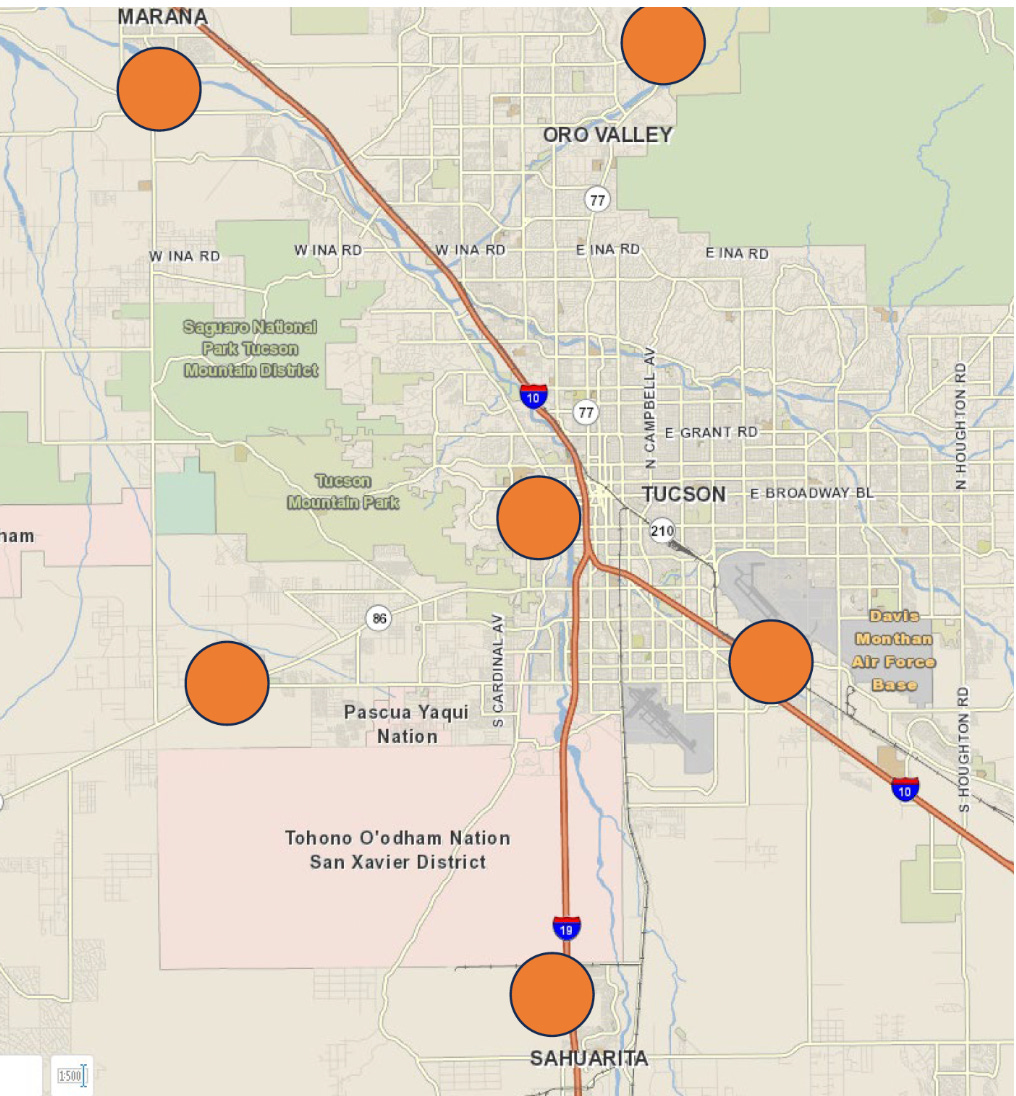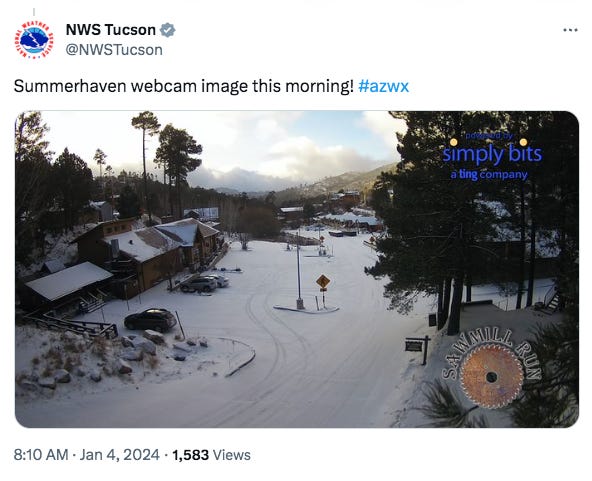The Daily Agenda: Help keep our blue skies blue
A county program offers up-front funding for people to switch from gas to electric garden tools … Residents can trade in mowers and other items for $400 in vouchers … The tamale bill is back.
If your New Year’s resolutions include being more environmentally friendly, Pima County has a program that can help kickstart that goal.
You can turn in your gas-guzzling mowers and garden equipment for up to $400 in vouchers to spend on electric, battery or manual models through the Cut Down Pollution program, which was launched in January 2020.
The process is simple:
Complete an online application, which will be reviewed by staff, usually within a few days. Once the application is approved, you have three weeks to bring each piece of equipment (drained of gasoline) to one of six partnering drop-off sites across the county.
Staff will sign, date and stamp the form, which you’ll then photograph and either email or text1 to the Pima County Department of Environmental Quality.
You’ll receive a voucher in the mail which can be redeemed at any area Home Depot.
A lot of the incentive programs out there focus on reimbursement after the new item has already been purchased, rather than giving people (and in this case businesses) up-front funding. But surprisingly, the program is underused, and the county said it’s been hard to get the word out.
With the recent addition of a sixth drop-off site in Marana, the county is hoping to attract more users and make the program more accessible to people who live in the northwest part of the county.
Program Director Karen Wilhelmsen called the public response to the program’s launch four years ago “gangbusters,” saying that more than 100 applications quickly rolled in.
Then the pandemic hit and the responses slowed way down. Wilhelmsen said there hasn’t been another large burst in applications since, and most of the ones that have come in have been tied to advertising and social media promotions.
Since the program’s launch, more than 1,150 lawn mowers, chainsaws, leaf blowers and other equipment have been turned into the county. This reduced air pollution to the tune of nearly 600 tons and an estimated 1,800 tons of carbon dioxide.
The program is the result of a state statute requiring municipalities with more than 500,000 residents to provide a voluntary program. It was launched in the late 1990s as a call-in program with scheduled appointments and specific drop-off times at a single county facility. It eventually fizzled out, but in 2019, the county was asked to bring it back and modeled the new version after Mowing Down Pollution out of Maricopa County.
But unlike Mowing Down Pollution, Pima County’s program has a few additional benefits. The Maricopa program is not open year-round and vouchers are limited to one per household per year.
“(Our program is) at the convenience of participants and we’re able to offer it throughout the whole year,” Wilhelmsen said.
Pima County’s program also allows private citizens to exchange up to six pieces of equipment at a time, and businesses aren’t capped.
The drop-off spots are scattered across Pima County, from Sahuarita to the newest location in Marana. The locations aren’t disclosed until the application is approved to discourage people from bringing in equipment without prior authorization.
Most of the people who have taken advantage of the program have been private citizens who use the equipment for their personal properties, but Wilhelmsen is hoping more landscaping companies will take advantage of the program, which offers added incentives to commercial businesses.
Private citizens are capped at one lawn mower for a $150 voucher and up to five different pieces of handheld equipment (a list can be found on the program’s website) for $50 vouchers each, for a total of $400 in vouchers.
Commercial companies can turn in an unlimited number of mowers and handheld items and also receive more voucher money — $200 — for lawn mowers.
“Some smaller businesses especially are going electric and even trying to incorporate solar,” Wilhelmsen said. “The technology keeps improving and making it more likely in coming years that those who have larger uses would be able to make the switch.”
One of the perks of making the switch, Wilhelmsen said, is that electric equipment is quieter than gas-powered items, helping keep the peace with neighbors who may not love waking up to the sound of landscapers. Electric equipment is also more reliable, she said.
“And residents who are using electric devices for private properties really enjoy the ease of not having to mess with the smelly gasoline and spillage,” Wilhelmsen said. “It seems to be a lot more convenient and enjoyable process.”
The City of Tucson is also getting on board with making the switch to electric-powered equipment. The city council is set to vote Tuesday on investing $5 million in ARPA funds into its climate action plan, some of which is earmarked to support the replacement of gas-powered landscaping equipment with electric models.
Cut Down Pollution is funded through June by a grant from the Arizona Department of Environmental Quality and Wilhelmsen said it looks as if the county will renew again in 2024 and receive money for another two years.
With the ongoing and urgent focus on climate change and sustainability efforts, she hopes that more people and businesses will take advantage of the program while also helping the planet.
Climate issues will likely take center stage in the 2024 legislative session and election cycle, and we know they’ll be a focus of many city and county initiatives. Help us stick around and continue reporting on these and other important topics!
Rave review: A bond credit rating agency gave a thumbs-up to the University of Arizona’s plan to get out of its financial crisis, the Arizona Daily Star’s Ellie Wolfe reports. Moody’s Investors Services said the plan gets a “credit positive” rating. To get out of the crisis, the UA put in place a hiring and compensation freeze, restrictions on purchasing, and other measures.
Don’t be a jerk: Cochise County Superior Court Judge John F. Kelliher, Jr. was reprimanded for making “condescending” comments to a mother during a juvenile dependency hearing in 2022, the Herald/Review’s Terri Jo Neff reports. After two written complaints, the Arizona Supreme Court’s Commission on Judicial Conduct found Kelliher’s remarks were “irrelevant” to the proceedings and caused the mother “unnecessary distress.” Last March, Kelliher was reprimanded for lack of “courtesy and dignity” in the courtroom.
Waiting around: Humanitarian aid volunteers set up a camp for migrants near Sasabe, a small town on the border southwest of Tucson, KGUN’s Ryan Fish reports. The tents and makeshift shelters are meant to shield migrants from the elements as they wait for Border Patrol agents to show up. Rather than wait, some migrants decided to walk 16 miles to the Border Patrol’s processing center.
Need some help: The Pima County Health Department is trying to fill 19 positions to help take care of asylum seekers after they are released by federal border officials, KVOA’s Lupita Murillo reports. The health department is holding a job fair on Friday at the Abrams Public Health Center to fill the temporary, full-time positions.
"What we want to do is to ensure when individuals go on to other what we call, interior cities, that they are healthy when they arrive there," Dr. Theresa Cullen, head of the health department, told Murillo.
Time for tamales: The “tamale bill” is back at the Arizona Legislature, Capitol Media Services’ Howard Fischer reports. The bill would expand the list of allowed “cottage” foods, like baked goods, to include tamales. Gov. Katie Hobbs vetoed a similar bill last year over concerns about food-borne illness. State Rep. Travis Grantham, a Republican from Gilbert, said he tweaked the bill to address her concerns, but still won’t allow home inspections.
Pipes, pets, and plants: A freeze warning is in effect this morning and Saturday morning, the Tucson Sentinel’s Dylan Smith reports. The temperature is going to drop to 29 degrees in most of Tucson and could dip to 18 degrees in some areas south and east of Tucson.
If you enjoy reading the Tucson Agenda, please consider sharing it with a friend.
17 million: The number of gallons of fuel, mostly gasoline, that’s estimated to be spilled each year while refilling lawn equipment — more than all the oil spilled by the Exxon Valdez in the Gulf of Alaska, according to the Environmental Protection Agency. It’s estimated that gas powered mowers contribute to 5% of the country’s air pollution.
You can send the photo of your stamped form to this email or 520-273-9898.









